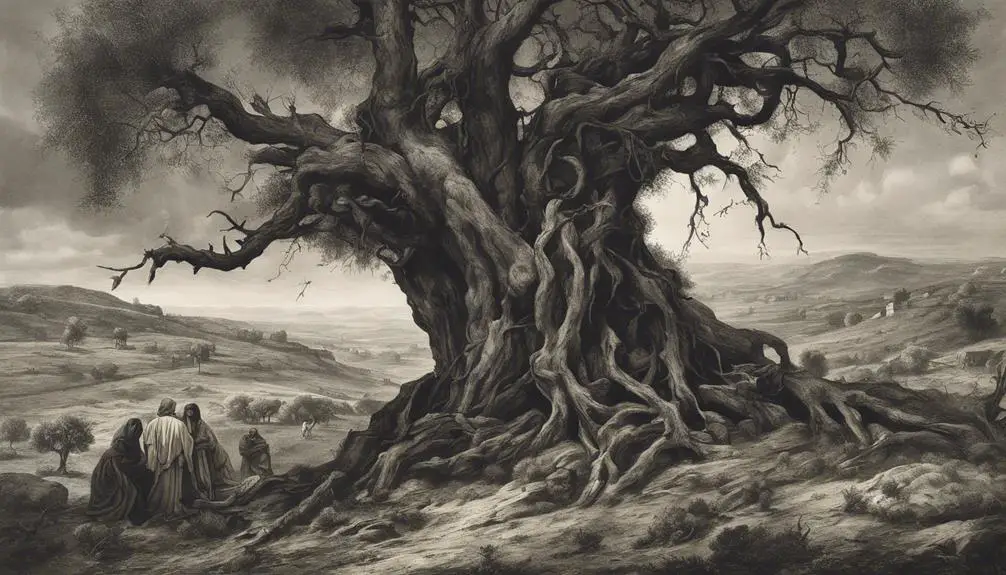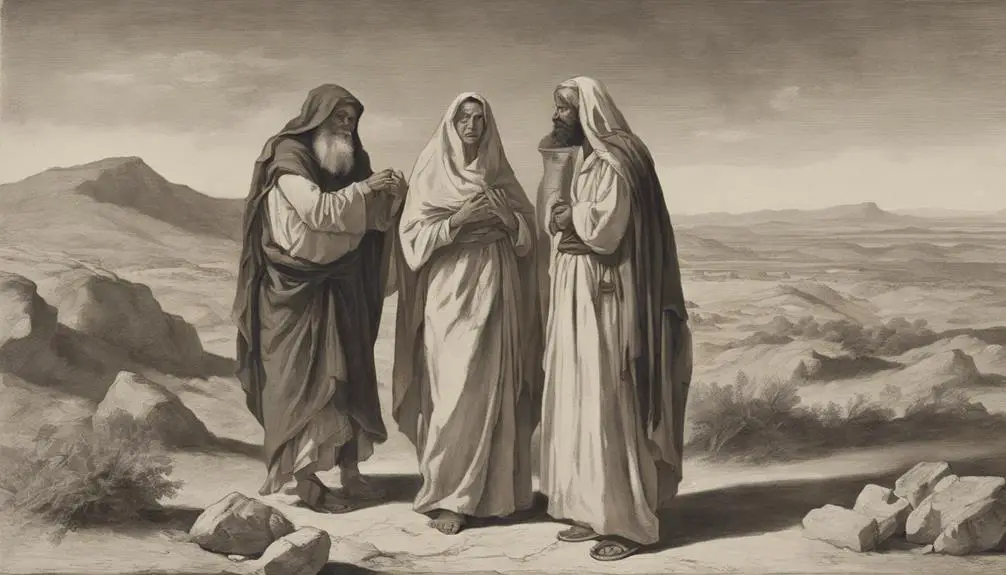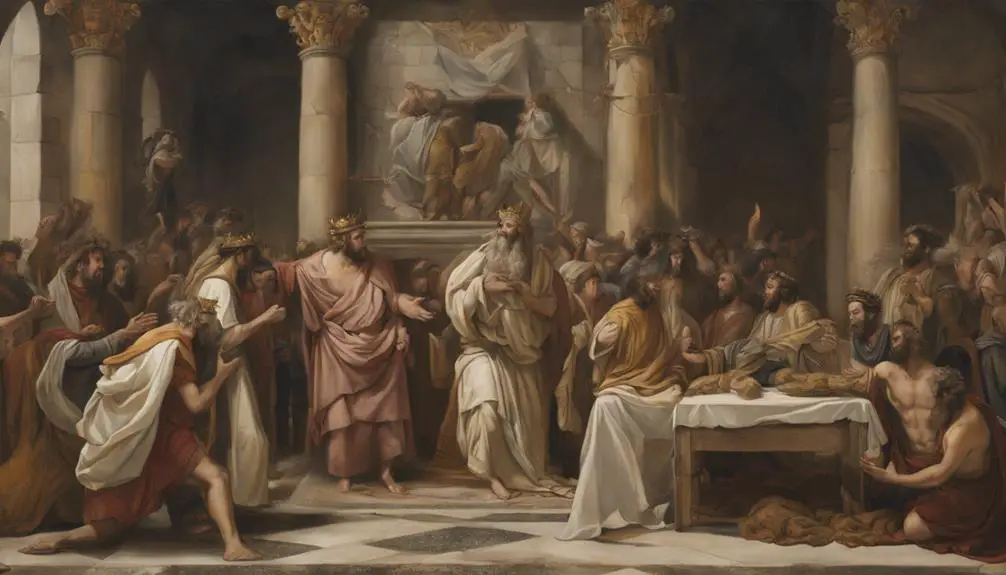Learn about the timeless tales of family discord in the Bible, revealing profound insights on human relationships and divine intervention.

Dysfunctional Families in the Bible
Imagine standing amidst the dust and heat of an ancient world, observing the first family feud between Cain and Abel. You've probably noticed that the Bible is filled with tales of dysfunctional families – from Abraham, Sarah, and Hagar's complex triangle, to Joseph's betrayal by his brothers, and even King David's turbulent household.
Even Jesus shared the parable of the Prodigal Son, a tale of two brothers and their strained relationship. So why are these stories of family discord so prevalent in such a sacred text? You might find that exploring this question offers a unique perspective on biblical narratives.
Key Takeaways
- The Bible depicts intense sibling rivalries, betrayals, and their devastating consequences, as seen in the stories of Cain and Abel, Joseph, and the Prodigal Son.
- Parental favoritism and jealousy complicate family dynamics, as exemplified in the narratives of Cain and Abel, and Sarah and Hagar.
- Human flaws such as deceit, betrayal, and rebellion can lead to severe family dysfunction, as illustrated in the stories of David, Absalom, and Amnon.
- Despite the dysfunction, the Bible also emphasizes the resilience, forgiveness, and potential for redemption within families, notably in the narratives of Joseph and the Prodigal Son.
Cain and Abel: The First Family Feud

Diving into the turbulent waters of the first family feud, you'll find Cain and Abel, whose bitter rivalry set the stage for numerous stories of familial dysfunction in the Bible. As the progeny of Adam and Eve, they were inescapably bound by sibling rivalry, a common theme that would reoccur in biblical narratives.
Cain, the firstborn, was a farmer while Abel, his younger brother, was a shepherd. Their occupations were as different as their temperaments. However, when it came to seeking God's favor, they were on an equal footing. The Bible recounts how each brought offerings to God. Abel's sacrifice, a firstborn lamb from his flock, was accepted while Cain's produce was rejected. This perceived parental favoritism by a divine parent catalyzed the conflict between them.
Cain's rage at this rejection led to the first recorded act of fratricide. This extreme manifestation of sibling rivalry underscored the catastrophic consequences of unchecked jealousy and resentment. Yet, this tragic tale also served as a cautionary narrative, warning of the dangers of parental favoritism, a recurrent motif in biblical family structures. Thus, the story of Cain and Abel set a precedent for later familial discord in biblical narratives.
Abraham, Sarah, and Hagar's Complex Triangle

Building on the theme of familial discord, we now turn our attention to the intricate triangle of Abraham, Sarah, and Hagar, which further illustrates the complexities of family relationships in biblical times. Sarah's jealousy of Hagar, her handmaid, was a significant driving factor in this tangled web. Despite Sarah's own encouragement for Abraham to sleep with Hagar in hopes of producing an heir, she couldn't handle the reality of her husband having a son with another woman.
This jealousy catalyzed Hagar's exile. Sarah's envy and fear of displacement led to Hagar's expulsion into the wilderness with her son Ishmael. This heavy-handed action reflects the harsh reality of complex family dynamics and the often cruel outcomes jealousy can yield. It's important to remember that Hagar, too, was a victim in this scenario. She was caught in a power struggle she didn't ask for, bearing the brunt of Sarah's jealousy and the dysfunctional family dynamics that ensued.
In examining this story, we see a family torn by jealousy, power struggles, and the desire for legacy. It's a stark reminder of how human flaws can complicate relationships and lead to devastating consequences.
Joseph's Betrayal by His Brothers

Shifting our focus, let's delve into the story of Joseph, whose betrayal by his own brothers paints a vivid picture of envy and rivalry within the confines of a family. As the 11th son of Jacob, Joseph's unique relationship with his father, exhibited through gifts like his coat of many colors, instigated intense sibling rivalry.
Joseph's dreams, which he interpreted to suggest his future dominance over his family, didn't help his case. They exacerbated the already existing friction, leading his brothers to plot against him. These dreams, while prophetic, were ultimately the catalyst for his betrayal.
His brothers, driven by jealousy, sold him into slavery, deceiving their father with the lie that Joseph had been devoured by a wild animal. It's a story of envy, deception, and betrayal, but also a story of resilience and forgiveness. Joseph's ordeal teaches us that sibling rivalry, when unchecked, can have devastating consequences.
Moreover, the narrative highlights the significance of dream interpretation in biblical times, noting its power to incite or diffuse tension. Joseph's story is a stark reminder that familial dysfunction isn't a modern phenomenon; it's as old as the scriptures themselves.
King David's Turbulent Household

Have you ever considered the tumultuous household of King David, another biblical figure whose family drama echoes the dysfunctions of modern times? David's adultery with Bathsheba, a woman married to one of his loyal soldiers, Uriah, was a pivotal turning point. The deceit and betrayal that followed, including the arranged death of Uriah, was a dark stain on David's reign, leading to severe consequences within his family.
Absalom's rebellion, David's son, was a direct result of this dysfunction. Absalom, embittered by his half-brother Amnon's assault on their sister Tamar and David's seeming indifference, took matters into his own hands. He murdered Amnon and later led a full-fledged rebellion against David. This rebellion, fueled by resentment and a longing for justice, resulted in a bloody civil war.
These incidents reflect a pattern of deceit, betrayal, and rebellion, reminiscent of many family dysfunctions we see today. It's a sobering reminder that even the most noble and powerful are susceptible to moral failings, and their actions can have devastating effects on their families. Recognizing these patterns can help us understand and navigate our own family dynamics better.
The Prodigal Son: A Tale of Two Brothers

Diving into the parable of the Prodigal Son, you'll discover a tale of two brothers that highlights different types of family dysfunction. This powerful narrative showcases sibling rivalry at its peak, and the redemption that can come from genuine repentance.
Let's break it down:
Brother |
Characteristic |
|---|---|
Prodigal Son |
Impulsive, reckless |
Older Brother |
Resentful, self-righteous |
The Prodigal Son, driven by youthful impulsiveness, squanders his share of the family inheritance. His actions aren't just financially reckless, they're a clear slap in the face of his father's honor.
The Older Brother, on the other hand, exhibits a form of self-righteousness that's just as damaging. He's dutiful, yes, but he also harbors deep resentment. When his wayward brother returns, repentant and in rags, he's not relieved. He's angry.
What's striking here isn't just the blatant sibling rivalry, but the father's response. He forgives the Prodigal Son, showing that repentance can lead to redemption. But he also gently rebukes the Older Brother, reminding him that grace shouldn't be taken for granted. This parable is a potent reminder that family dysfunction often stems from misunderstanding, resentment, and a lack of forgiveness.
Frequently Asked Questions
What Are Some Other Examples of Dysfunctional Families in the Bible Not Mentioned in This Article?"
You're asking about additional examples of family secrets revealed and biblical parenting failures that weren't covered in the article.
King David's family is one notable instance. His children suffered from infighting, rebellion, and even incest.
Another example is Lot's family, where his daughters tricked him into incestuous relationships.
These examples show that even in biblical times, families weren't immune to dysfunction and turmoil.
What Impacts Did These Family Dynamics Have on the Broader Societies They Were Part Of?"
You might note that societal influence and biblical consequences are inextricably linked. Dysfunctional dynamics often lead to social chaos, distrust, and conflict. They can erode foundational values and norms, causing ripple effects throughout the society.
Such impacts aren't just isolated incidents, they can shape the course of history, altering societal structures and belief systems. It's a potent reminder of how family dynamics can significantly impact broader societies.
What Are the Psychological Interpretations of the Familial Relationships in the Bible?"
When you explore psychological interpretations of familial relationships, you'll notice instances of 'Biblical Narcissism.' These are situations where characters exhibit excessive self-love or admiration.
Simultaneously, 'Divine Interventions' often play a role in these relationships, causing family members to act out of character or beyond their capabilities.
These elements can provide useful insights into the psychological dynamics that play out in these relationships.
How Do These Biblical Stories of Dysfunctional Families Relate to the Concept of Sin and Redemption?"
You're tasked to explore how tales of misfortune tie into the concept of sin and redemption.
You'll find sinful patterns, like deceit and betrayal, often lead to a downfall.
Yet, redemption possibilities exist, showing us that despite our flaws, we can seek forgiveness and change our course.
These narratives show us the consequences of our actions and the potential for transformation, even in the face of grave mistakes.
Are There Any Lessons or Moral Teachings in These Stories That Can Be Applied to Modern Families Dealing With Dysfunction?"
Absolutely, you can apply lessons from these stories to today's families. They teach you about the harmful effects of parental favoritism and sibling rivalries.
You'll see that favoritism can breed resentment and conflict. Sibling rivalries, if unchecked, can escalate to extreme levels. These tales show us the importance of communication, understanding, and fairness in family relationships.
They're not just ancient stories, they're timeless lessons in handling family dysfunction.
Conclusion
You've explored the trials and tribulations of biblical families, highlighting their dysfunction.
From Cain and Abel's feud to the complex dynamics of Abraham, Sarah, and Hagar, you've seen how family issues aren't a modern invention.
Joseph's betrayal and King David's tumultuous household further illustrate this.
The story of the Prodigal Son rounds out these examples, reminding you that forgiveness can heal even the deepest family wounds.
Understanding these narratives can provide insight into your own familial experiences.



Sign up